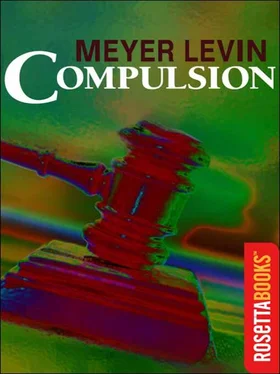Kessler tried again, about the boy. Could he talk to Paulie?
“Remember, the address is 1360 East 63rd Street. You will receive further instructions at that time.” Their receiver clicked down.
“Wait! Wait-”
Judge Wagner seized the phone. “Operator! Operator-” But it was too late to trace the call.
“He told me a drugstore, on 63rd Street…” Then, despairingly, Kessler clapped his hand to his head. He couldn’t remember the address of the store.
From the phone next to Judd’s, Artie had meanwhile sent off the cab. Judd felt anew the pleasure in the whole thing, a kind of duet with Artie, the smoothness of their working together.
The woman had selected her rouge, and now she turned to them with a naughty-boy gleam. “Well, whose girl is it?” she asked coyly.
“Oh, it’s a double date,” Artie said, giving her his smile.
Judd looked at his watch. “Come on, we can just make it.” This time he took the wheel. Artie’s wild driving might get them into a smash-up. Especially if he had an idea he was racing a train.
I WAS WAITING on the sidewalk when the Pierce-Arrow drove up to the mortuary. “He’s in here, Mr. Kessler.” Jonas Kessler, taking off his derby hat, followed me into the rear of the shop.
“That’s Paulie!” he cried instantly. And from him came a harsh, gasping wail of grief piercing through, as from archaic times.
Two policemen had come. They stood with Swaboda, their faces fixed in respect. “Oh, this is dastardly,” the uncle kept saying, and I noted that people in a crisis seem to use words they have read somewhere. “Dastardly! They murdered him, and now they are trying to collect a ransom. My brother is waiting with the money in his hand for them to call.” He approached the body, raised his arm to touch it, but let his arm drop. “I have to telephone. No time must be lost.”
We led him to the desk, but for a moment he did not have the heart to pick up the phone. “I have children of my own. Paulie was like one of my own,” he remarked. I offered to make the call. “No time must be lost,” Jonas Kessler repeated, and still sat motionless. “They said the boy is safe. How can they… Oh, this is dastardly.”
At the Kessler house, the doorbell rang. A Yellow Cab driver stood there. Kessler picked up the cigar box full of money and started toward the door. But the address, the address! A drugstore on 63rd Street?
“Did they tell you the address?” he asked the driver.
The cabby was bewildered. “Didn’t you call, mister?”
“The address to go to, on 63rd Street -?”
And at that moment, the telephone rang again. Kessler hurried back into the house. Perhaps it was the kidnapper calling once more, a miracle from God.
Judge Wagner handed him the phone. “It’s your brother.”
“Charles, this is Jonas. I have to tell you. Charles, they were right. It is Paulie.”
Kessler’s face remained rigid. Automatically, tonelessly, he asked if his boy had suffered.
It always seemed to me a telling part of this tragedy that the victims were somehow external to it. The boy himself, since we came to know him only in death, never existed for us. The father we saw a good deal of, as he gave himself entirely to the case, and yet he was an utterly enclosed man. The mother we only glimpsed, once or twice. We never learned much about her, except that she was some fifteen years younger than her husband and that she suffered a nervous collapse.
In a sense, this impersonality of the victims seemed fitting; in the world as I was to come to know it, the victims mattered very little. The Kessler murder was the first to show us how the victim can be chosen at random.
Judd made it to 63rd and Stony Island with seven minutes to spare, before the train arrived. He drove a block farther, to a Walgreen’s; he had Walgreen phone slugs ready in his pocket. Everything was working beautifully. Artie clapped him on the back as they entered the store.
Judd called the number they had noted – the booth in Hartmann’s Drugstore – where Kessler should by then be waiting. Artie was jittery, watching out of the window, watching the I.C. tracks.
The phone was ringing. There had been ample time for the cab to bring Kessler there. Since ordering the cab, Judd himself had driven all the way from Twelfth Street, over twice as far.
Artie opened the booth door. “You sure you got the right number?”
At that moment someone answered the phone. “Hello?”
“Is that the Hartmann Drugstore?”
A Negro voice said, “Yah, who do you want, mister?”
“Will you see if a Mr. Kessler is in the store? He should be waiting for this call.” If Kessler was there, why hadn’t he answered, himself?
“Mr. Who?” the Negro asked.
“Isn’t there a man waiting for a call? A Mr. Kessler?”
“What number do you want?”
Judd kept his voice under control. “Just ask if a Mr. Kessler, a customer-”
“Don’t see any customer in the store right now.”
“Are you sure?”
“Nobody here, mister.” And the receiver clicked.
Artie had gone pale. He rushed out of the store, half ducking as if expecting cops to be waiting outside.
Curiously, Judd found in himself nothing of the despair he had felt when that detail had gone wrong at the Help Keep the City Clean box. Instead, he experienced a new, sharp excitement. Joining Artie outside the store, he said, “Let’s drive past Hartmann’s.”
“Too risky.” Artie flung away a just-lighted cigarette.
“We could phone and check if the Yellow went out.”
Artie’s restless eyes fell on a news stand, on a Globe headline: UNKNOWN BOY FOUND DEAD IN SWAMP.
“The jig is up,” Artie said, with his nervous way of lapsing into detective-story talk. “Come on, let’s get the hell out of here!”
But in Judd the sense of ascendancy grew stronger. Artie was getting jittery, but his was a cool, cool mind. Buying the paper, he stood against the window of a men’s-wear shop, reading the story. “So they found the body,” he said. “They still have no clue to its identity.”
“Christ, don’t be a fish! Since the paper got this story, that’s hours ago. The cops can put that much together – a body, and a kidnapped kid. They’re not that dumb.”
“Don’t get scared so easy,” Judd said. “One must go to the end of an experience.”
Artie stared down into his eyes. Judd felt strong, the stronger. “You stupe, this is the end!” Artie hissed. “We’d better get rid of this goddam car and split up!”
Folding the newspaper, Judd started back into Walgreen’s. Artie caught his sleeve. “Where are you going?”
“I’m going to try another call. We’ve still got a minute before the train. Maybe the cab was late, or anything. Why should we give up just because he might be stuck in the traffic?”
“You and your damned bird-chasing!” Artie burst out. “You knew just the right place. Birdland! Nobody ever went near there. Nobody would even find the body!”
That was unfair. And something in Judd still kept denying the finding. Something in him insisted it was still the right place, the only place, the place where the body had to be put. And there could be no identification! Had they not poured the acid, to obliterate identity? But beyond that, deeper, was some kind of knowledge, some kind of insistence that the body would be impossible to identify because… because who was it? Deep in himself something was saying nobody could ever know.
It was a confusing, unclear thought. Judd didn’t like it, because it was unclear. He wrenched free of Artie to go and telephone.
“Jesus, not from here. They might have traced the last call!”
They hurried to the next corner, a candy store.
Читать дальше












